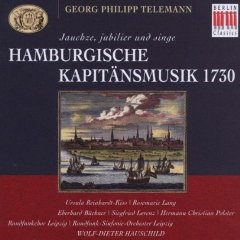Telemann - Jauchze, jubilier und singe, TWV 15:5a (Dieter Hauschild) [2003]
Telemann - Jauchze, jubilier und singe, TWV 15:5a (Dieter Hauschild) [2003]

1. Aria: Jauchze, jubiliere und singe (Freude) 4:52 2. Recitative: Was hat der Mensch (Freude) 1:17 3. Chorale: Was helfen uns die schweren Sorgen? 0:45 4. Chorus: Darum ist nichts Bessres (Der Freudigen Gemuter) 1:55 5. Aria: Was machest du? (Traurigkeit) 4:49 6. Recitative: Ich weiss von keiner bosen Zeit (Freude) 1:24 7. Der im Himmel wohnet lachet ihr (Chor der freudigen Gemüter) 1:37 8. Recitative and Chorus: Doch aber (Traurigkeit, Der Freudigen Gemuter) 1:51 9. Chorale: Es sind ja Gott (Chor der Freudigen Gemuter) 0:52 10. Recitative: Gesetzt denn auch (Traurigkeit) 0:20 11. Es ist Trauren besser denn Lachen (Chor der traurigen Gemüter) 4:49 12. Aria: Ein jedes Ding hat seine seine Zeit (Wahrheit) 4:44 13. Recitative: Es bleibt indes dabei (Wahrheit) 0:55 14. Aria: Hundert Jahr im Flore steben (Zeit) 4:36 15. Recitative: Ja, ja, lasst Herz und Mund (Dankbarkeit) 1:55 16. Aria: Preiset den Hochsten (Dankbarkeit) 5:08 17. Recitative: Ich muss den Blick (Zeit) 1:23 18. Herr Gott, dich loben wir (Chor der dankbaren Gemüter) 0:56 19. So gehe hin und iss dein Brot mit Freuden 1:37 Ursula Reinhardt-Kiss (soprano), Rosemarie Lang (mezzo-soprano), Eberhard Büchner (tenor), Siegfried Lorenz (baritone), Hermann Christian Polster (bass). Rundfunkchor Leipzig, Rundfunk-Sinfonie-Orchester Leipzig. Wolf-Dieter Hauschild – conductor From Oratorio Kapitänsmusik 1730
Until the 18th century there was no conflict between sacred and secular music. Composers didn't bother to rework their secular compositions as religious works. Well-known examples are Bach and Handel. The so-called 'Kapitänsmusiken' by Telemann attest to the fact that sacred and secular music can go hand in hand, as they consist of an oratorio with a sacred text and a serenata with a secular text. In order to understand the reasoning behind these compositions it is important to understand the political and social situation in Hamburg.
From the Middle Ages Hamburg was an economically important city, especially since it joined the Hanseatic League. Its economic position resulted in many political conflicts, in particular with Denmark with which it was in almost constant rivalry. It also had led to Hamburg being declared an imperial city in 1510. Because of this the city couldn't count on the protection provided by the imperial army and had to organise its own defence. The city founded a civic guard for defence from attacks from outside as well as for deployment in the fighting of natural catastrophes. From 1619 it was a permanent institution.
The armed citizens were divided into companies and regiments according to the city's parishes. From 1680 Hamburg was divided into five parishes. Consequently the civic guard consisted of five regiments arranged in 57 companies. In Telemann's time the city had more than 10,000 armed men in the civic guards. Each company was led by a Captain (Kapitän), and the Captains were elected by an electoral college which consisted of the colonel, the lieutenant colonel and the other captains of a particular regiment. As a permanently constituted college they formed a highly regarded institution in the city and were entrusted with various communal duties.
By way of thanks for their service to the community the city offered a festive banquet which was held almost every year on the Thursday after St Bartholomew's Day (24 August). It was at these occasions that Kapitänsmusik was performed. Originally each piece consisted of just one part, being performed after the first course of the meal. In 1719 for the first time a composition was performed which was divided into an 'oratorio' and a 'serenata'. It is not known when the two parts were performed. It is assumed the serenata was meant as 'table music'.
During Telemann's time in Hamburg 36 such occasions took place. Although it is very likely the celebration didn't take place every year, it must have been held more often than nine times. As only nine of Telemann's Kapitänsmusiken have been preserved complete one has to assume a considerable number of his compositions in this genre have been lost. It is not the first time CPO has released recordings of this kind of music. About 15 years ago Michael Schneider with his ensemble La Stagione Frankfurt recorded the Kapitänsmusik of 1755, and some years earlier Wolfgang Helbich recorded the oratorio from the Kapitänsmusik of 1730. ---Johan van Veen, musicweb-international.com
download (mp3 @320 kbs):
yandex 4shared mega mediafire zalivalka cloudmailru uplea








